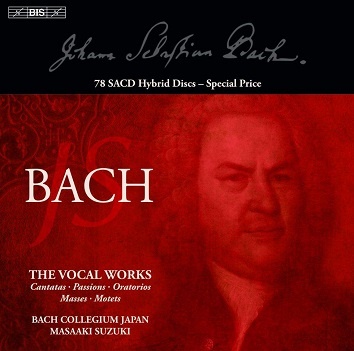
Los Pajaros Perdidos
L'arpeggiata
Christina Pluhar/Philippe Jaroussky/Lucilla Galeazzi
CD
1 disc(s) 19-01-2012
Classical | World Music
Bestel- en levertijd
De getoonde levertijden (met uitzondering van In Stock-items) zijn enkel en alleen een gemiddelde op basis van de eerdere prestaties van achterliggende groothandels, distributeurs, labels en fabrieken.
Indien er geen voorraad is bij de Nederlandse distributeur, of het label, dan kan het soms enkele weken duren! Dit betreft dan vaak een landelijke situatie.
Neem gerust eerst contact met ons op indien u een deadline heeft. Wij kijken dan meteen of dit haalbaar is! *


| Extra info: | Christina Pluhar/Philippe Jaroussky/Lucilla Galeazzi |
|---|---|
| Dirigent: | CHRISTINA PLUHAR |
| Drager: | CD |
| Maatschappij: | Warner Music |
| Label: | Erato |
| Barcode: | 5099907095023 |
| Artikelcode: | K97456 |
| Suffix - prefix: | 0709502 |
| Solist(en): | CHRISTINA PLUHAR |
Philippe Jaroussky (countertenor) & L'Arpeggiata, Christina Pluhar (direction)
In a characteristically thrilling fusion of musical styles, L’Arpeggiata, the prizewinning ensemble led by harpist Christina Pluhar, presents a programme of Spanish and Latin American music that ranges from the 17th century to the present day. Guest vocalists include French countertenor Philippe Jaroussky, who sings the lyrical title tango, ‘Lost Birds’ by Ástor Piazzolla.
A thrilling and arresting fusion of musical styles and techniques is a trademark of L’Arpeggiata, the multi-faceted instrumental and vocal ensemble led by Christina Pluhar. This new collection – which takes its name, ‘Los Pájaros perdidos’ (‘the lost birds’), from a piece by the King of Tango, Ástor Piazzolla – brings a heady Latin American mix. Echoes from the pre-Columbian era, African rhythms and the styles and structures of the European Baroque all enrich this survey of music from the 17th century to the present day, with a geographical spread that covers Spain, Argentina, Chile, Paraguay and Venezuela.
The ensemble offers an array of exotic stringed instruments: the arpa llanera (a harp with a distinctive tinkling, airy sound); cuatro (a form of small, four-stringed guitar); bandolin (a kind of 15-stringed mandolin); jarana (an eight-stringed guitar); requinto (a high-pitched guitar), and charango (a small Andean guitar originally constructed from an armadillo shell). They are complemented by percussion, trumpet and clarinet, while the vocal parts are taken by French countertenor Philippe Jaroussky and Italian vocalist Lucilla Galeazzi (who both featured on L’Arpeggiata’s 2010 Mediterranean-themed album Via Crucis), the mezzo soprano Luciana Mancini (heard on L’Arpeggiata’s recording of the Monteverdi Vespers, receipient of Germany’s prestigious Echo award in 2011), the Spanish soprano Raquel Andueza and the Neapolitan-trained ballet dancer-turned-singer Vincenzo Capezzuto, who brings his haunting alto tones to several numbers. There are virtuosic guest instrumentalists too: Raul Orellana, on the charango, the Paraguayan harpist Lincoln Almada, and the Argentinian guitarist Quito Gato.
The title track is a lyrical tango, with a klezmer-like clarinet curling round Jaroussky’s vocal line, while the many other striking number include: the lively Pájarillo Verde from Venezuela, which will please fans of the Buena Vista Social Club; the melancholy Alfonsina y el Mar, sung by Lucilla Galeazzi; the haunting La embarazada del viento, with a powerful performance from Luciana Mancini; the sensual, purely instrumental Caballo Viejo and a version of the well-known bolero Besame mucho, with soprano Raquel Andueza, that is reminiscent of some of Peggy Lee’s sexier recordings.
Anonymous Popular Argentine / Quito Gato
1. Duerme Negrito - Philippe Jaroussky
Ariel Ramírez / Félix Luna / Quito Gato
2. Alfonsina y el Mar (Zamba) -Lucilla Galeazzi
Anonymous Popular Venezuela
3. Montilla - Luciana Mancini
Anonymous Popular Paraguay
4. Pájaro Campana (Polca) - Lincoln Almada, Quito Gato
Astor Piazzolla / Mario Trejo / Quito Gato
5. Los Pájaros perdidos (Canción) - Philippe Jaroussky
6. Anonymous Popular Venezuela
Pájarillo Verde (Pájarillo) - Luciana Mancini
Anonymous Popular Paraguay
7. Isla Sacá (Polca) - Lincoln Almada, Quito Gato
Constantino Ramones
8. La embarazada del viento (Gaita Margariteña) - Luciana Mancini
Hamlet Lima Quintana / Noberto Ambros / Alfredo Rosales / Quito Gato
9. Zamba para no morir (Zamba) - Vincenzo Capezzuto
Pancho Cabral / Quito Gato / Christina Pluhar
10. Ay ! este azul - Philippe Jaroussky
Juan Bautista Plaza / Quito Gato
11. El Curruchá - Vincenzo Capezzuto, Luciana Mancini
Anonymous Popular Venezuela
12. Caballo Viejo (Pasaje) & Alma Llanera (Joropo) - Lincoln Almada, Quito Gato
Luis Mariano Rivera / Quito Gato / Christina Pluhar
13. La Cocoroba (Joropo oriental) - Vincenzo Capezzuto
Antonio Nella Castro / Hilda Herrera / Quito Gato
14. Zamba del Chaguanco (Zamba) - Philippe Jaroussky
Adela Gleijer / Diana Reches / Quito Gato / Christina Pluhar
15. Como un pájaro libre - Vincenzo Capezzuto
Maria Elena Walsh / Quito Gato / Christina Pluhar
16. Como la Cigarra - Philippe Jaroussky, Raquel Andueza
Otarolo Domínguez
17. Ojito de Agua - Raul Orellana
Anonymous Popular Venezuela / Quito Gato / Christina Pluhar
18. Polo margariteño - Luciana Mancini
Padre Antonio Soler / Christina Pluhar
19. Fandango - Sarah Ridy
Consuelo Velasquez
20. Besame mucho (Bolero) - Raquel Andueza
"This may be a crossover disc, but it offers a fascinating fusion of early European and Latin American music, in what Pluhar, its director-theorbist, calls “South America’s living baroque”...If Philippe Jaroussky sounds out of place, the earthy, sensual vocalists Lucilla Galeazzi and Luciana Mancini are the real deal."
Sunday Times - 19th February 2012
"L´Arpeggiata, de sprankelende groep van Christina Pluhar, verkent op z’n jongste cd de relatie tussen Spanje en Zuid-Amerika. Van een barokke geestelijke die de fandango danst, blijkt het maar een kleine stap naar de Argentijnse tangokoning Astor Piazzolla .
Een oude/muziekensemble dat Besame mucho uitvoert en een countertenor die Piazzolla zingt: kan het gekker? Ach, als ene Christina Pluhar zich ermee bemoeit vormen zulke uitstapjes de gewoonste zaak van de wereld. Dan wil zelfs een ster als Philippe Jaroussky zijn stem wel beschikbaar stellen voor een aantal tracks. Pluhar en haar ensemble L’Arpeggiata zijn immers synoniem met even wonderlijke als vanzelfsprekende combinaties van stijlen, vormen en tijdperken. Sinds de oprichting in 2000 heeft het ensemble de oude-muziekwereld veroverd met een energieke mix van vrolijk snarenspel en intelligente dwarsverbanden. Men schakelde aansprekende gastmusici in, zoals de zangers Marco Beasly, Nuria Rial en Philippe Jaroussky, maar ook een keur aan vooraanstaande volksmusici die zich met veel plezier voor Pluhars karretje laten spannen. Cd’s als La Tarantella, Los impossibiles en het recente Via Crucis zijn mooie voorbeelden van projecten die reiken van de renaissance tot muziek van vandaag. Dat de volksmuziek daarin vaa een cruciale rol speelt is gezien de belangrijkste instrumenten die Pluhar speelt – harp, gitaren en de theorbe – niet zo gek. Harp- en gitaarachtige instrumenten hebben in folk immers altijd een belangrijke rol gespeeld. Dat is ook weer duidelijk te horen op de jongste loot aan Pluhars stam: Los pájaros perdidos (de verloren vogels). De cd ontleent zijn naam aan een tango van Astor Piazzolla en dat vertelt meteen een deel van het verhaal. Pluhar en haar metgezellen richten hun pijlen op de relatie tussen het Latijns-Amerika van Argentinië, Chili, Paraguay en Venezuela en het Europese Spanje, dat weer een warme invloed heeft ondergaan van de Arabische en joodse wereld. Het biedt Pluhar de mogelijkheid haar liefde voor diverse exotische snaarinstrumenten uit te leven op instrumenten als de arpa llanera (een harp met een bijna doorschijnend metaalachtig geluid), de bandolin (een kruising tussen een banjo en een mandoline), de cuatro (een kleine viersnarige gitaar) en de charango (de kleine gitaar uit het Andes bergte). De muziek vliegt vrolijk van hot naar her en heeft als verbindend element de aanstekelijke latin-ritmes die in een meer rudimentaire vorm in Spanje al eeuwenlang een belangrijke rol spelen. Voor die link staat de Fandango van Padre Antonio Soler (1729-1783) symbool. Juist doordat dit werk bijna aan het einde van de cd staat, krijgt al het voorgaande perspectief. Zo klinken in de populaire Argentijnse en Venezolaanse volksliederen opeens de onzekere reizen door van de missionarissen en emigranten die Zuid- Amerika wel even zouden veroveren en bekeren. En horen we tot in een tango van Astor Piazzolla de fusie tussen de verfijnde ritmische patronen van de inheemse bevolking en de wetten van de Europese kunstmuziek. Die tango van Piazzolla, Los pájaros perdidos, krijgt hier extra reliëf door de stem van Philippe Jaroussky. Zonder afbreuk te doen aan de mooie prestatie van vocalisten als Lucilla Galeazzi en Raquel Andueza, weet Jaroussky (net als op Via Crucis, zijn eerste samenwerking met L’Arpeggiata), e tracks waaraan hij bijdraagt te verheffen tot kleine juweeltjes van vocale vertelkunst. Daarmee bewijst de Franse countertenor zijn status als een van de beste en meest gevraagde zangers van zijn generatie. Dat hij in zijn overvolle schema, dat hem op 19 februari met het Freiburger Barokorchester en een mooi Händelprogramma naar het Amsterdamse Concertgebouw brengt, tijd maakt voor en volle aandacht geeft aan de projecten van Pluhar, zegt veel over het belang, de intelligentie en de musiceervreugde ervan. Jaroussky geeft daarbij niet alleen Piazzolla’s tango maar ook meesterlijke volksliedjes als Ay! Este azul en Duerme negrita een vertuigingskracht mee die je direct doet geloven dat er nooit mooiere liedjes zijn geschreven. Het is een vorm van programmeerkunst en briljante timing dat Pluhar en consorten na zo’n moment de betovering met aanstekelijke ritmes verbreken, zonder de sfeer en de vreugde van de hele cd geweld aan te doen. Op zo’n manier valt zelfs het overbekende en hier door Raquel Anduezza sens el gezongen Besame mucho – ooit geïnspireerd door een aria uit de opera Goyescas van Enrique Granados – als vanzelfsprekend op zijn plaats."
Klassieke Zaken Magazine

















